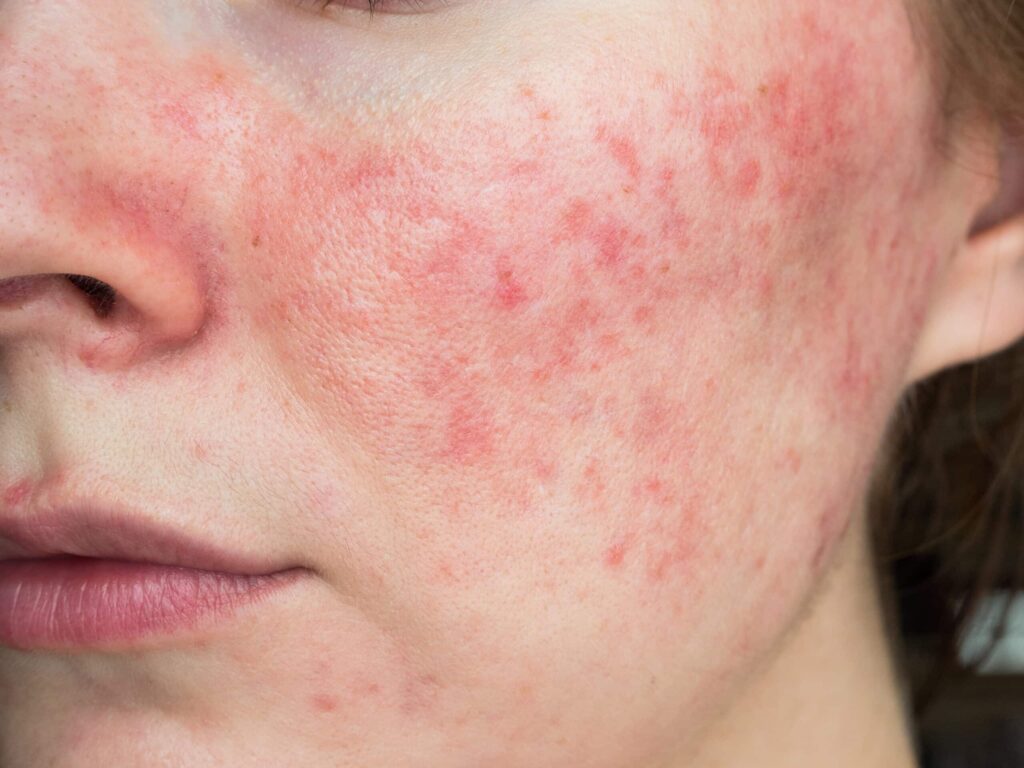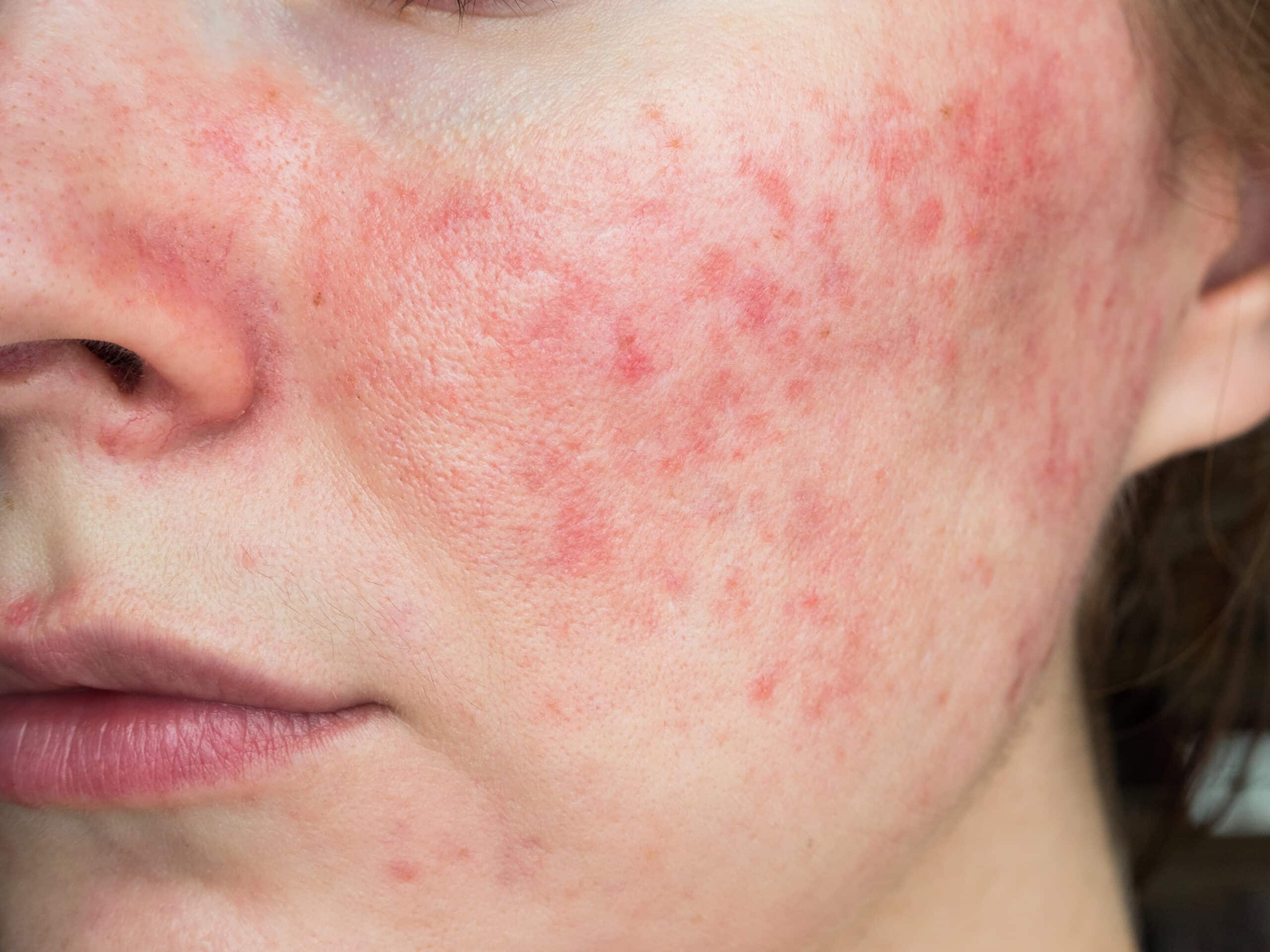
Dr Eva Teh: Is Rosacea Impossible to Treat in Singapore’s Weather?
- September 29, 2023


Rosacea is a chronic inflammatory skin condition characterised by redness or flushing on the face, sometimes alongside pus-filled bumps that resemble acne. There is no definite cause for rosacea, but it is believed to be brought about by a combination of reasons, such as genetic predisposition, lifestyle and environmental factors.
Rosacea is not impossible to treat, but definitely challenging as heat and humidity are known triggers and aggravating factors. As rosacea is a chronic inflammatory skin disorder, treatment aims to control symptoms, prevent worsening of the condition and complications.
In this article, we’ll find out just how the weather triggers rosacea and the preventive steps people can take.
Rosacea is sometimes confused with acne. So, it’s important to set out rosacea’s distinct characteristics. The redness associated with rosacea, for instance, tends to cover a larger area of the face, as opposed to acne, where redness appears around the pimple. Other indications of a rosacea flare-up include:
According to the National Rosacea Society, of a survey of 1,190 respondents, 85% said that the sun and hot weather lead to a flare-up. Conversely, 46% said that cold weather triggers their rosacea symptoms.
Personally, my patients tend to experience the worst outbreaks during a stressful period in life and following travel to countries with drastic temperature changes during summer (heat and humidity) and winter (chilly winds and dry air). Although moderately cool temperatures can be soothing for rosacea, rainy days in Singapore can be also be associated with increased humidity.
These flare-ups may be related to the dilation and constriction of blood vessels on the face, as an effect of the extreme temperatures.
Sun exposure and its ultraviolet rays can also cause rosacea flare-ups and there is no exact scientific explanation for this. However, studies suggest that it may have to do with UV radiation affecting skin inflammation, and the development of new blood vessels under sunlight (telangiectasia).
Telangiectasia refers to the visible surfacing of small blood vessels on the skin, and is a common symptom of rosacea. Repeated sun exposure can also permanently weaken and dilate blood vessels.
In the sunny island of Singapore, it’s important to apply broad-spectrum sunscreen of SPF 30 before you head out, and remember to reapply sunscreen every 2 hours. It also helps to time your exercise routine when the sun is not so intense — early in the morning or after the sun sets.
Humidity is another thing to watch for in Singapore if you have rosacea. Humidity causes sweating, which can then cause skin irritation and trigger rosacea symptoms. Hot and humid weather can also cause the blood vessels of the skin to dilate, increasing blood flow, resulting in increased flushing of the face.
To prevent flare-ups, try to stay in cool, well-ventilated areas, minimise your exposure to humid environments, and use a clean cloth to lightly dab off the sweat.
Exposure to harsh winds can cause dry skin and trigger rosacea symptoms. Ensuring that your skin stays adequately moisturised is very important. Opt for fragrance-free moisturisers, or those specially formulated for sensitive skin. Facial balms that help lock in moisture and form a protective barrier on the surface of the skin are also viable options.
When travelling to chillier countries in the winter, it is also important to prevent windburn by keeping your face covered as much as possible. Remember to pack jackets with pull-up collars and hoods, as well as scarves to protect you from the strong winds.
A very dry environment can trigger rosacea symptoms, causing skin dryness, burning sensations and discomfort.
Some people can have dry or oily skin when suffering from rosacea. Either way, moisturising is still a must! Patients with rosacea may already have a damaged skin barrier, making it harder for the skin to retain moisture, leading to drier skin.
As mentioned earlier, opt for a rosacea-friendly moisturiser that has skin barrier repairing properties and is non-irritating.
The weather may not be dry in Singapore, but people do spend a lot of time in air-conditioned interiors, including their homes, to escape the heat. It can help to have a humidifier nearby to add some moisture to your environment.
In the previous sections, we’ve gone through the various ways the weather can trigger rosacea, while also outlining some mitigating steps people can take. One overarching solution, which ties into the need to understand your rosacea better, is to keep a diary and document the symptoms you experience.
Rosacea may not be caused by a single factor and keeping track of your activities and the food you consume, together with the weather, can put you in a better position to manage your rosacea.
Other than taking preventative measures in extreme temperatures, and opting for gentler skincare, you can also boost your skin’s overall health and try medical-grade solutions to control your flare-ups.
Soolantra, medically known as Ivermectin, is a topical prescription medication specially formulated to reduce inflammation and the papules and pustules caused by rosacea, helping improve the condition of your skin.
Soolantra can also be used in combination with other topical medications or oral antibiotics for a more comprehensive rosacea management. If you are considering Soolantra for rosacea treatment, consult SL Aesthetic Clinic for a detailed skin evaluation and recommendation on a treatment plan that would best suit your needs.
Like what you read? Share them!